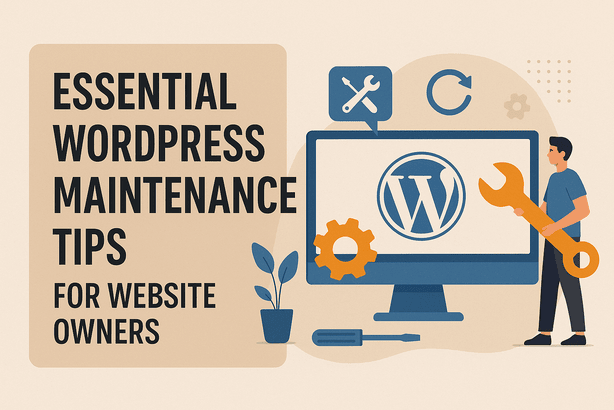Consistent updating of WordPress core and plugins helps maintain website security, stability, and performance optimization. Neglecting to update WordPress and plugins can expose your website to security breaches, malware attacks, and performance degradation. Outdated WordPress installations and plugins are prime targets for hackers due to their increased vulnerability.
Furthermore, outdated plugins may be incompatible with the latest WordPress version, potentially causing functionality issues and conflicts with other plugins. Regular monitoring of updates and new releases is crucial. Enabling automatic updates for WordPress core and plugins can help ensure timely implementation of critical updates.
However, it is advisable to test updates on a staging site before applying them to the live website to prevent unexpected issues.
Key Takeaways
- Regularly updating WordPress and plugins is crucial for website security and performance
- Backing up your website regularly ensures that you can easily restore it in case of any issues
- Monitoring website security helps in identifying and fixing any vulnerabilities
- Optimizing website performance improves user experience and SEO rankings
- Cleaning up your database helps in improving website speed and efficiency
- Reviewing and updating content keeps your website relevant and engaging
- Monitoring website analytics provides valuable insights for improving website performance and user experience
Back up your website regularly
Choosing the Right Backup Solution
There are various backup solutions available for WordPress, including plugins that automate the backup process and store the backup files securely offsite. It is recommended to create both full backups (including all website files and the database) and incremental backups (which only include changes since the last full backup) to ensure comprehensive coverage.
Storing Backups Securely
Additionally, it is important to store backups in a secure location, such as a cloud storage service or an external server, to prevent data loss in the event of server failure or hacking.
Testing and Implementing a Robust Backup Strategy
Regularly testing your backups by restoring them to a staging environment can help ensure that they are functional and reliable when needed. By implementing a robust backup strategy, you can safeguard your website against unforeseen events and minimize downtime in case of emergencies.
Monitor website security
Monitoring the security of your WordPress website is essential to protect it from potential threats and vulnerabilities. Hackers are constantly looking for ways to exploit security loopholes in websites, making it crucial to stay vigilant and proactive in securing your website. Implementing security measures such as using strong passwords, enabling two-factor authentication, and limiting login attempts can help deter unauthorized access and brute force attacks.
Furthermore, installing a reputable security plugin can add an extra layer of protection by scanning for malware, monitoring file changes, and blocking suspicious activity. Regular security scans and audits can help identify any vulnerabilities or malware infections that may have compromised your website. It is also important to keep an eye on security advisories and updates from WordPress and plugin developers to stay informed about potential security risks and patches.
In addition to proactive measures, having a contingency plan in place in case of a security breach is crucial. This may include having a security team on standby, implementing a web application firewall, or subscribing to a security monitoring service. By staying proactive and vigilant in monitoring website security, you can minimize the risk of security breaches and protect your website and its data from unauthorized access and malicious attacks.
Optimize website performance
| Metrics | Value |
|---|---|
| Page Load Time | 2.5 seconds |
| Page Size | 800 KB |
| Number of Requests | 30 |
| Mobile Page Speed Score | 85/100 |
Optimizing the performance of your WordPress website is essential for providing a seamless user experience and improving search engine rankings. Slow-loading websites can lead to high bounce rates and lower user engagement, impacting both user satisfaction and SEO performance. There are several strategies for optimizing website performance, including optimizing images, leveraging browser caching, minifying CSS and JavaScript files, and using a content delivery network (CDN) to distribute content geographically.
Regularly monitoring website performance using tools such as Google PageSpeed Insights or GTmetrix can help identify areas for improvement and track the impact of optimization efforts. Additionally, implementing a caching plugin can help reduce server load and improve page load times by storing static versions of your website’s pages. It is also important to regularly review and optimize your website’s code, remove unnecessary plugins and scripts, and ensure that your hosting environment meets the performance requirements of your website.
Furthermore, mobile optimization is crucial for providing a seamless experience across devices and improving search engine rankings. With an increasing number of users accessing websites on mobile devices, ensuring that your website is responsive and optimized for mobile performance is essential. By regularly optimizing your website’s performance, you can provide a fast and efficient user experience while also improving your website’s visibility in search engine results.
Clean up your database
Regularly cleaning up your WordPress database can help improve website performance and reduce the risk of database-related issues. Over time, databases can become bloated with unnecessary data such as post revisions, spam comments, trashed items, and expired transients. This can lead to increased database size, slower queries, and potential performance issues.
Using database optimization plugins or running manual database cleanup queries can help remove unnecessary data and optimize database tables. It is important to back up your database before performing any cleanup operations to prevent data loss in case of accidental deletion or corruption. Additionally, regularly scheduling database maintenance tasks such as optimizing tables, repairing corrupted tables, and removing unused data can help keep your database running smoothly.
Regularly monitoring database performance metrics such as query execution time, database size, and table fragmentation can help identify potential issues that may require cleanup or optimization. By keeping your database clean and optimized, you can improve website performance, reduce server load, and minimize the risk of database-related issues impacting your website’s functionality.
Review and update content
Improving Visibility and Attracting Organic Traffic
Updating existing content with fresh information, new insights, or relevant keywords can help improve its visibility in search engine results and attract more organic traffic. Regularly adding new content such as blog posts, articles, or multimedia can also help keep your website dynamic and engaging for visitors.
Monitoring User Engagement Metrics
Monitoring user engagement metrics such as bounce rate, time on page, and conversion rates can provide insights into which content may need updating or improvement.
Leveraging Tools for Optimization
Leveraging tools such as Google Search Console or SEMrush can help identify opportunities for optimizing existing content or creating new content based on keyword performance and search trends. By regularly reviewing and updating your website’s content, you can ensure that it remains relevant, informative, and engaging for visitors while also improving its visibility in search engine results.
Monitor website analytics
Regularly monitoring website analytics is essential for understanding visitor behavior, identifying trends, and measuring the effectiveness of your marketing efforts. Tools such as Google Analytics provide valuable insights into key metrics such as traffic sources, user demographics, page views, conversion rates, and more. By regularly reviewing website analytics data, you can gain insights into which pages are performing well, which traffic sources are driving the most visitors, and which marketing campaigns are generating the best results.
This information can help inform strategic decisions related to content creation, marketing initiatives, user experience improvements, and more. Additionally, setting up custom reports or dashboards in Google Analytics can help streamline the process of tracking key metrics that are relevant to your specific business goals. Regularly reviewing these reports can provide valuable insights into the effectiveness of your website’s performance and marketing efforts.
Furthermore, leveraging A/B testing or multivariate testing can help optimize website elements such as landing pages, calls-to-action, forms, and more based on real user data. By regularly monitoring website analytics data and leveraging insights to make informed decisions, you can continuously improve your website’s performance and user experience while maximizing the impact of your marketing efforts. In conclusion, regular maintenance of your WordPress website is essential for ensuring its security, performance, relevance, and effectiveness in achieving your business goals.
By implementing best practices such as updating WordPress core and plugins, backing up your website regularly, monitoring security measures, optimizing performance, cleaning up your database, reviewing and updating content, and monitoring website analytics; you can ensure that your website remains secure, efficient, engaging for visitors while also maximizing its impact on achieving business objectives. Regularly reviewing these aspects of your website’s maintenance will help you stay ahead of potential issues while continuously improving its performance and effectiveness in achieving your business goals.





Leave a Reply